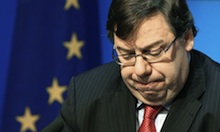
The Dublin government triggered a torrent of national anger on Sunday night when it handed over economic sovereignty to European and International Monetary Fund administrators for an 85 billion euro loan.
The bailout package for the 26-County state has been vehemently condemned by the opposition parties, who are now all expected to vote against Dublin’s annual budget plan on December 7th.
An average annual interest rate of 5.8% will apply to the loans -- a rate lower than the 6.7% that had been rumoured, but still significantly higher than that required of Greece in a similar bailout plan earlier this year.
The repayment costs alone over the next four years approximate the 15 billion euro in austerity budget cuts and taxes which were outlined last week.
Sinn Fein President Gerry Adams said the government had negotiated “a terrible deal”.
“The 5.8% interest rate is unaffordable,” he said. “The decision to force the state to take 17.5 billion euro out of the Pensions Reserve Fund to pour into black hole that is our banking system is a disaster.
“Sinn Fein had proposed 7 billion euro be taken from the Pension Reserve Fund for a jobs stimulus programme. The Government refused to do this. But now they are prepared to rob the pension fund to give a digout to the bankers.
“The decision to protect bondholders is disgraceful. The banks are getting another 15 billion euro while simultaneously 15 billion euro is being taken out the economy - out of people’s pockets.
“The costs of this deal to ordinary people will be deep and will result in hugely damaging cuts to public services, social welfare and wages.”
Fine Gael, the largest opposition party, said the coalition government had been “cleaned out” because of an over soft approach to the talks on the 85 billion euro bailout package.
The party’s finance spokesman, Michael Noonan, said the government had achieved very little in its talks with the teams from the European Commission, the European Central Bank and the International Monetary Fund but had sacrificed too much in return.
“I believe that the negotiators on the Irish side were soft,” he said. The National Pension Reserve Fund had been “cleaned out”.
“The interest rate is extremely high. If the IMF part is just over 3 per cent as reported, it must mean that the average EU interest rate must be very high, well over 5.8 per cent.”
Meanwhile, the government has denied that, under the constitution, the agreement must be approved by the Dublin parliament in a vote -- a position which is likely to lead to a court action.
The Labour Party sharply criticised the deal as a “national sell-out” that would leave Irish citizens saddled with a crippling debt for many years.
The party was particulalry scathing at the decision to leave the majority of international bondholders -- mainly international and sovereign wealth funds -- unscathed.
“The Fianna Fail Government has shown no backbone, no negotiating ability and no authority, said party leader Eamon Gilmore.
“The EU and the IMF have had a walk-over in negotiations with a broken and demoralised Government, that is serving out its notice and which has neither the political mandate nor the moral authority to conclude such a deal.”
Colleague Pat Rabbitte said the deal would “pauperise” the country.
“Now we are going to bend the knee and do as we are told by our European masters.” He said the raiding of the pension reserve fund would leave the cupboard bare.
“We have nothing to fall back on . . . The ECB has us where they want us,” he said.
The 32 County Sovereignty Movement called on the Irish people to “take back their sovereignty” through protest actions.
In a statement, it called “on all republican organisations and the labour movement to unite and organise the shutting down of the state.
“This is not a time for righteous rhetoric or for tinkering with the status quo. It is a time to reach out and effect fundamental change for our people.”
![[Irish Republican News]](https://republican-news.org/graphics/title_gifs/rn.gif)
![[Irish Republican News]](https://republican-news.org/graphics/title_gifs/harp.gif)

